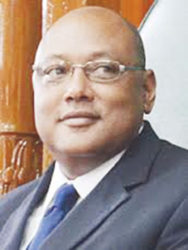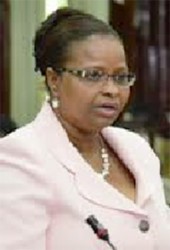The Alliance for Change (AFC) has accepted Minister of Public Health Volda Lawrence’s explanation of her role in the $605 million emergency drug procurement for the Georgetown Public Hospital Corporation (GPHC) which did not comply with the law.
However, Party Leader Raphael Trotman said, the issue highlights the need for the speedy start of work by the Public Procurement Commission (PPC). “I could see how it happened and I accept Minister Lawrence’s account of how she found herself in this unfortunate situation,” Trotman told Stabroek News on Friday.
“The whole matter raises glaring and fundamental flaws in the system which I am hoping the PPC will address speedily. All of this reinforces the need to have the PPC up and running so that we don’t have a repeat of this,’ he also said. The AFC is the junior partner in the governing coalition of which APNU is the major part. Lawrence is a senior member of the PNCR, the main constituent of APNU.


PPC Chairman, Carol Corbin, has said that the body will be reviewing the $605 million procurement. She explained on Friday that the commission was in the process of gathering information but could not give a date when its findings on the matter would be ready. “We cannot take a week to investigate properly, not even two.
We have to process all the information before we can comment,” she said.
Lawrence has welcomed the PPC’s intervention saying that she would be in contravention of APNU+AFC’s standards of accountability and transparency if she did not want the PPC to investigate.
Nonetheless she has instructed that the newly appointed GPHC Board conduct an investigation of the procurement after which its findings would be shared with the public.
The Public Health Minister has come in for severe criticism for her role in fast-tracking the $605 million procurement but she has distanced herself from the process saying she was not involved.
While Lawrence had previously admitted to fast-tracking the contract, she told media operatives at a press conference, at the National Communications Network studios on Monday last, that as minister she “is not involved in the process of procurement”. She said her role was to declare there was an emergency and trigger the hastening of the procurement.
She said that at the time the decision was made to fast track the contract there was no board directing the affairs of the hospital so the responsibility fell to the minister to make a decision.
Lawrence had commented on the matter before but some parts of the procurement were not addressed and on Monday last she sought to bring clarity to her role and the overall need of the GPHC that saw over $605 million in drugs being purchased from ANSA McAl.
Priority
“My priority is to ensure the nation’s health is given top priority. The health system will not be held hostage by unprincipled persons and therefore I made the decision to shortlist the critical but unavailable items and the suppliers with the ability to provide them on time to avert deepening the drug demand difficulties,” a statement released by her ministry, on March 11 quoted her as saying.
According to the ministry, after meeting with public health officials around the country and at the GPHC, the minister “was compelled in the interest of the health of the people” to ensure that an adequate supply of drugs were immediately available in the country “to meet the current crisis… To this end, she sought to fast track the procurement of these pharmaceuticals to minimize the negative effects on patients due to the shortage of some critical drugs.”
The statement said, “This influenced the decision to seek the greenlight from the National Procurement and Tender Administration Board (NPTAB) for ANSA McAL to supply drugs and pharmaceuticals to the tune of some $605 million.”
At that time no explanation was provided for why approval from the NPTAB was only sought after the fact, rather than have it manage the process in keeping with its statutory responsibility.
Lawrence has explained that a GPHC Board had not been in place and as such could not have been involved. The previous board had been dissolved before the end of its life. She said the announcement that there was a shortage of drugs was triggered through an investigation she had initiated after becoming Minister of Public Health in January of this year.
She pointed out that from that report some 287 drugs were in short supply. She subsequently met with GPHC management and senior officials who confirmed there was a shortage of drugs. “I met with the team and during our discussions to ascertain why there was a shortage …I was told some things…I was told there were over 200 drugs in short supply,” she said.
On Monday last, she pointed to pages 174 to 176 of the Auditor General’s 2015 report for justification for going to ANSA and three other companies for emergency supplies and which she said also shows that there had been major shortcomings by many suppliers who won bids but failed to deliver.
The four companies, she said, would have stated their ability to supply the specified drugs within a two-week period.
Lawrence said she did not know how the contract was split but she received a call one morning alerting her to ANSA’s $605 million contract and she immediately enquired about it. “I wanted to know why ANSA was being given that amount,” she asserted.
It was GPHC Chief Executive Officer Allan Johnson, she said, who informed her that the company had been granted the award based on a tender issued and it was handling the cold chain aspect which required bringing drugs that needed to be stored at specified temperatures and from as far as Europe.
“They were flying these things in and most of their drugs were coming from Europe and as a result of that, that is how it ended up to being that amount of money,” she explained.
She lamented that it was the day after the she cleared up the $605 million procurement that the matter was raised in the press and the “roller coaster” began.
‘Upright’
Trotman said that having known Lawrence for nearly 25 years, he could attest that she was not one to be lax when it came to financial matters. He pointed out too that it was one of the reasons she was chosen to be Chairman of Parliament’s Public Accounts Committee.
“I have had the benefit of reading Ms Volda Lawrence’s comments and response. I have known Ms Lawrence for almost quarter of a century and I have always found her to be upright in her dealings, particularly with financial matters. Unless I see something to the contrary, I am prepared to accept her account of what has happened. It does at the same time expose some serious and glaring flaws in the procurement system, such that a minister like myself could himself or herself be in peril, as Volda Lawrence has found herself, because there are persons who manipulate a system but I can see, personally, no wrongdoing in Ms Lawrence’s actions.”
Further, he added, “She was new to the ministry and she was responding to a request that was made to her for her to sign off on something that was considered critical or a crisis.”
It was Lawrence’s accounting and managerial skills that saw President David Granger replacing Dr George Norton with her at the Public Health Ministry. The President had noted that the ministry had a management problem “in terms of material and human resources and the delivery of services to the various regions in Guyana and I believe she would be ideally suited to that ministry.”





